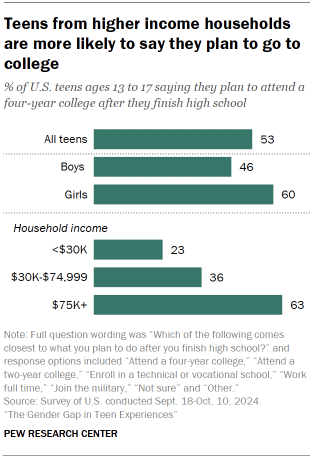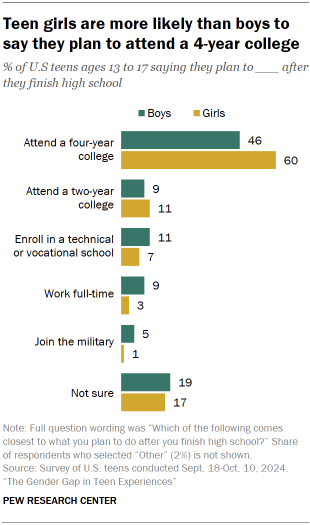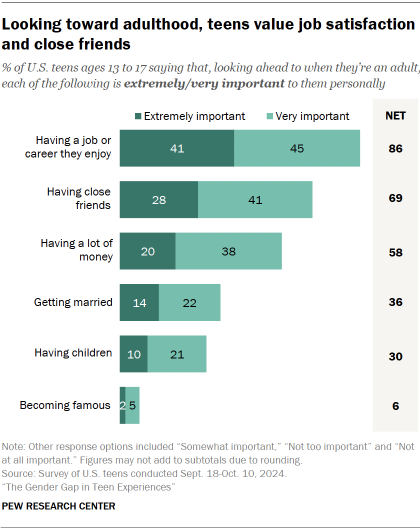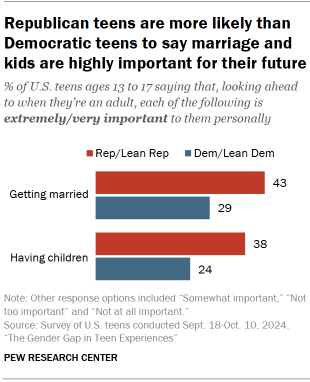Given the current gender gap in college completion and the growing share of adults who don’t want to have children, we were curious about teens’ long-term goals and plans for adulthood.
Plans after high school

When we asked teens what they plan to do after they finish high school, 53% said they plan to attend a four-year college.
Among teens, plans for attending college after high school differ by key demographics:
- Gender: 60% of girls, compared with 46% of boys, say they plan to attend a four-year college.
- Household income: Teens from households that make over $75,000 annually are the most likely to say they plan to go to a four-year college after high school (63%). A much smaller share of teens from households with incomes under $30,000 say the same (23%).
Some teens have other plans for after high school, including:
- Attending a two-year college (10%)
- Enrolling in a technical or vocational school (9%)
- Working full time (6%)
- Joining the military (3%)
About one-in-five teens (18%) are unsure of their plans.

Boys are more likely than girls to say they plan to enroll in a technical school, work full time or join the military after high school.
Boys and girls are about equally likely to say they aren’t sure of what they plan to do after high school.
There are also racial and ethnic differences on a couple of items. A 55% majority of White teens say they plan to attend a four-year college, while Hispanic teens are less likely to say this (43%). Among Black teens, 50% say they’ll attend a four-year college (not significantly different from White or Hispanic teens). In turn, Black and Hispanic teens are more likely than White teens to say they plan to attend a two-year college (13% and 15% vs. 7%). The sample size for Asian teens is too small for separate analysis.
Future goals
We also asked teens about some long-term goals – specifically, what they hope to achieve as adults.

A large majority of teens (86%) say it’s extremely or very important to them to have a job or career they enjoy when they’re an adult. This includes 41% who say this is extremely important.
Majorities also say having close friends (69%) and having a lot of money (58%) are highly important to them.
Smaller shares of teens place a high level of importance on family life milestones like getting married (36%) and having children (30%). We saw a similar pattern among adults in 2023 when we asked what they thought was important in order for people to live a fulfilling life. Job satisfaction and having close friends ranked higher marriage and parenthood.
Of the potential goals we asked about, fame is least important among teens. Only 6% say becoming famous is important to them personally. By contrast, 80% say this is not too or not at all important.
Boys and girls answer similarly on all these items, except for one: Girls are 9 points more likely than boys to say having close friends is highly important to them (74% vs. 65%).
There are also a couple notable racial and ethnic differences. Black and Hispanic teens are more likely than White teens to say having a lot of money is extremely or very important. Some 76% of Black teens and 66% of Hispanic teens say this, compared with 50% of White teens.
In turn, White teens are more likely to say having close friends in adulthood is highly important: 75% say this, compared with 64% of Hispanic teens and 62% of Black teens.
Views by political party

Republican and Republican-leaning teens are more likely than Democratic and Democratic leaners to say getting married (43% vs. 29%) and having children (38% vs. 24%) are highly important to them personally.
This also mirrors what we saw when we asked adults what makes a fulfilling life. In 2023, about a third of Republican adults said having children or being married is extremely or very important in order for people to live a fulfilling life. About one-in-five or fewer Democratic adults said the same.
On the other items, teens from both parties give similar answers.




